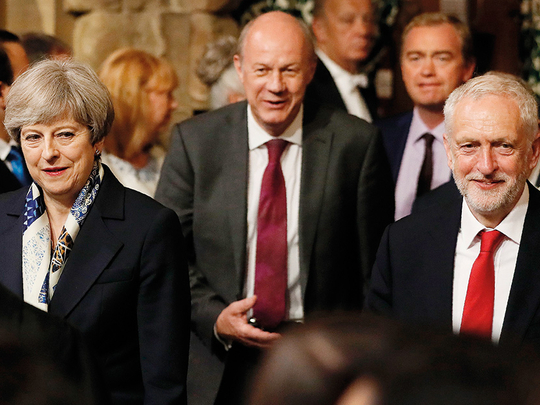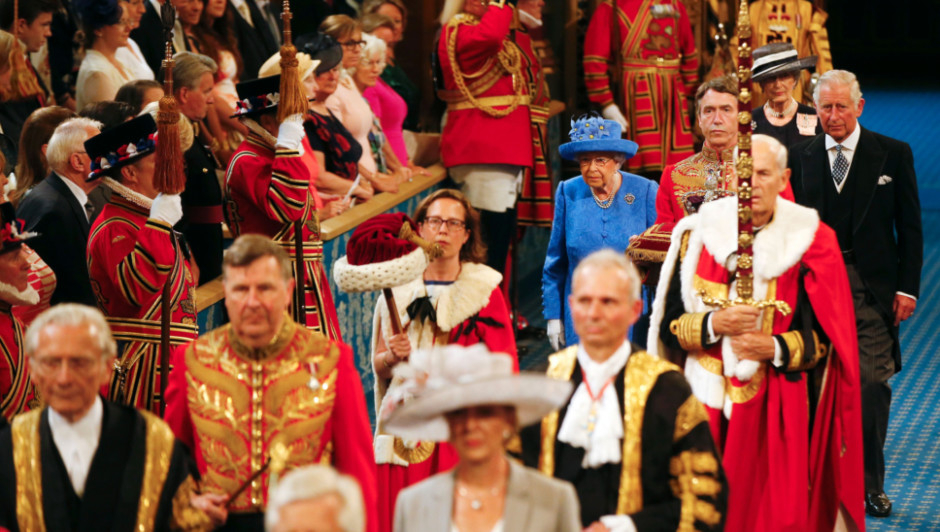
Lonodn: Brexit will dominate UK Prime Minister Theresa May’s programme for the next two years, with the government planning eight new laws to ease Britain’s withdrawal from the European Union.
In a ceremony to mark the formal opening of Parliament in London on Wednesday, Queen Elizabeth II outlined the legislative programme the House of Commons will consider in its two-year term.
Bills on topics from immigration and trade to fisheries and agriculture will supplement the government’s main Brexit initiative, a repeal bill designed to transpose all current EU legislation into British law, to take effect once Brexit has been completed in 2019.
“My government’s priority is to secure the best possible deal as the country leaves the European Union,” the queen said in a ceremony stripped of much of its usual pageantry. “My ministers are committed to working with Parliament, the devolved administrations, businesses and others to build the widest possible consensus on the country’s future outside the European Union.”
The government programme underscores May’s fragility after she miscalculated in calling a snap general election that stripped her Conservatives of their majority and left her dependent on the votes of 10 lawmakers from Northern Ireland’s Democratic Unionists, though no final deal between the parties has yet been announced. With a vote next Wednesday on the content of the Queen’s Speech, and lacking enough lawmakers in her own party to secure its passage, the premier has little choice but to stick to measures she feels can win support across parties.
While governments typically give advance notice of about 20 new laws per year in a Queen’s Speech, the government on Wednesday announced just 27 new bills to fill a two-year period. That’s a reflection of May’s precarious position in Parliament, beholden as she is to the whims of the DUP as well as lawmakers in her own party to advance her programme.
‘Weak and wobbly’
In a sign of the challenge May faces to pass the measures in Parliament, Rebecca Long Bailey, the business spokeswoman for the opposition Labour Party, said it plans a “whole range of amendments” to the government’s proposals, including on the economy, care for the elderly and industrial strategy.
“What we’ve heard today was a very weak and wobbly and vague speech from a prime minister who’s very uncertain of her future,” Long Bailey told the BBC.
With no majority and no mandate for the hard Brexit that she wanted, May also faces a series of battles to advance her EU withdrawal plans through Parliament. Those who campaigned last year to stay in the EU — including some of her own ministers — could fight proposals to pull Britain out of the bloc’s customs union and set up its own regime, while curbs on immigration are likely to be another flashpoint: May has prioritised bringing the numbers down, while Remainers say the needs of businesses to attract international talent and fill skills gaps should be prioritised.
Still, there are enough Euro-sceptics in Parliament who prefer May’s original vision for Brexit and could still complicate matters for her if she does soften her strategy.
The Brexit bills outlined in Wednesday’s speech are:
“We need to get Brexit right,” May said in a statement accompanying the speech. “That means getting a deal which delivers the result of last year’s referendum and does so in a way which commands maximum public support.”
Absent from the legislative programme are flagship manifesto promises on selective schools and on paying for care for people with dementia and other ailments that lack cross-party support. The care issue in particular bogged down the Tories’ election campaign, with the premier forced into a U-turn just days after advancing a policy to fund the costs from a person’s estate when they die, with only £100,000 (Dh465,292 or $126,000) protected. After a backlash from her own lawmakers and from opposition parties who branded it a “dementia tax,” she said costs would be capped.
Instead, the non-Brexit legislative programme is taken up by measures that are likely to garner cross-party support, with bills to curb domestic violence and strengthen tenants’ rights, as well as measures to allow space rockets to be launched from British soil, promote electric cars and invest in high-speed rail. There was no mention of a plan for a parliamentary vote to end a ban on hunting foxes with dogs.
“Having dropped everything from the dementia tax to fox hunting. I assume the only reason they have proposed a Space Bill is so they can shoot their manifesto into space and pretend it never existed,” said Tim Farron, the outgoing leader of the Tories’ former coalition partners, the Liberal Democrats.
Corporate governance
Also absent was any mention of moving forward with government proposals on executive pay and the structure of boards that riled businesses last year. May’s office said it remains committed to reforming corporate governance.
“This welcome change in tone needs to be backed by clarity and action now,” said Carolyn Fairbairn, director-general of the main business lobby group, the Confederation of British Industry. “Firms will expect all politicians to put pragmatism before politics, starting with Brexit.”
After a series of terrorist attacks in London and Manchester this year, May also announced she’ll review counter-terrorism strategy to ensure police and the security services have the powers they need, as well as set up a new commission to counter extremism. And after missteps this month following a devastating fire in a west London tower block, the government said it will set up an independent public advocate to act for bereaved families following public disasters.
The premier’s first test is winning votes on June 28 and 29 on the contents of the speech itself. May can probably count on her own lawmakers next week, and though the DUP may try to keep negotiations with the Tories going for as long as possible to squeeze out extra spending pledges, it is also likely to fall into line.













